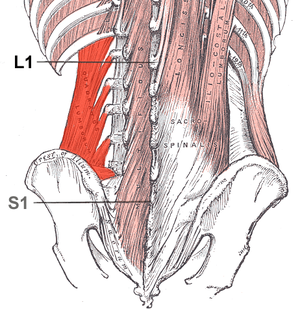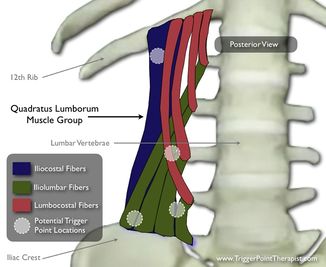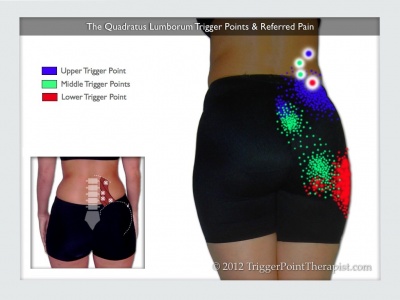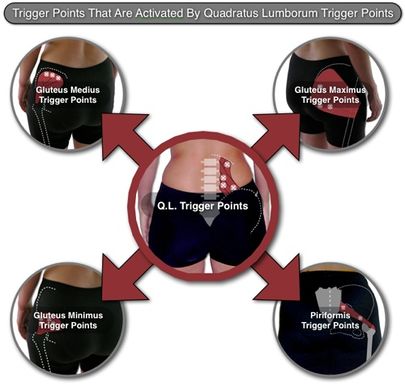Quadratus Lumborum
Top Contributors - Vanessa Rhule, Lucinda hampton, Kim Jackson, Ahmed Nasr, George Prudden, Joao Costa, Admin, Wendy Walker, Naomi O'Reilly, WikiSysop and Wanda van Niekerk
Description[edit | edit source]
The word quadratus comes from the Latin word "quadrus" meaning “square” while Lumborum comes from the Latin word "lumbus" for “loin.”
A thick, irregular, quadrilateral-shaped muscle sheet that lies in the posterior abdominal wall.
Anatomy[edit | edit source]
Origin[edit | edit source]
Medial half of lower border of 12th rib and tips of transverse processes of lumbar vertebrae.[1][2]
Insertion[edit | edit source]
Iliolumbar ligament and internal lip of Posterior iliac Crest.[1][2]
Nerve Supply[1][edit | edit source]
- Subcostal nerve (T12).
- Iliohypogastric and Ilioinguinal nerve (both from L1).
- Branches from the ventral rami (L2 and L3).
Blood Supply[3][edit | edit source]
- Branches of the subcostal artery.
- Branches of the lumbar arteries.
- The lumbar branch of the iliolumbar artery.
- The arteria lumbalis ima from the median sacral artery.
Function[edit | edit source]
Actions[3][edit | edit source]
- Quadratus Lumborum fixes the 12th rib to stabilize diaphragm attachments during inspiration.
- Lateral flexes the vertebral column.
- Extends lumbar vertebrae.
- It forms with the contralateral Tensor fascia lata and Gluteus medius a lateral myofascial sling which aims to maintain frontal plane stability of the pelvis.
Functional contributions[edit | edit source]
- The primary antagonist to each Quadratus Lumborum muscle is the Quadratus Lumborum muscle on the other side of the body.[4]
- The muscle group is considered a postural muscle group.
- It's one of the muscles that tends to be tight and overactive.[5]
Trigger Point Referral Pattern[edit | edit source]
Techniques[edit | edit source]
Palpation[edit | edit source]
Related Pathologies[edit | edit source]
Dysfunction of the Lumbar structures whether degenerative, neuropathy, and/or inflammatory, may contribute to poor muscle firing and weak stabilization by the QL. [6]
Lumbar spine pathologies like bulging discs, and facet joint hypertrophy from chronic inflammation may effect nerve conduction and response to the QL and Iliopsoas resulting in poor muscle stabilization and mechanical stress from chronic contracture. [6]
Moaratty-Koehler Syndrome (MKS) is another condition related to QL dysfunction
Treatment[edit | edit source]
Resources[edit | edit source]
References[edit | edit source]
References will automatically be added here, see adding references tutorial.
- ↑ 1.0 1.1 1.2 Anatomy expert. 3D - Quadratus lumborum. Available from: http://www.anatomyexpert.com/app/structure/5307/ (accessed from 19 April 2019)
- ↑ 2.0 2.1 Keith L. , Anne M. R . Clinically Oriented Anatomy 7th edition. philidephia : Lippincott Williams & Wilkins.2017
- ↑ 3.0 3.1 Radiopaedia. Quadratus lumborum. Available from: http://radiopaedia.org/articles/quadratus-lumborum (accessed 15 August 2015)
- ↑ Perry D. Quadratus Lumborum Trigger Points: Masters of Low Back Pain | TriggerPointTherapist.com [Internet]. Triggerpointtherapist.com. 2011 [cited 15 August 2015]. Available from: http://www.triggerpointtherapist.com/blog/quadratus-lumborum-trigger-points/ql-trigger-points-masters-low-back-pain/
- ↑ Page .P, Frank C, Lardner R. Assessment and Treatment of Muscle Imbalance: The Janda Approach .Champaign . Human Kinetics. 2010.
- ↑ 6.0 6.1 Acupuncture Integrated. Low Back and Lower Body Myofascial Pain Syndromes. Available from: http://www.acupunctureintegrated.com/articles/low-back-and-lower-body-myofascial-pain-syndromes [accessed 19 April 2019].










